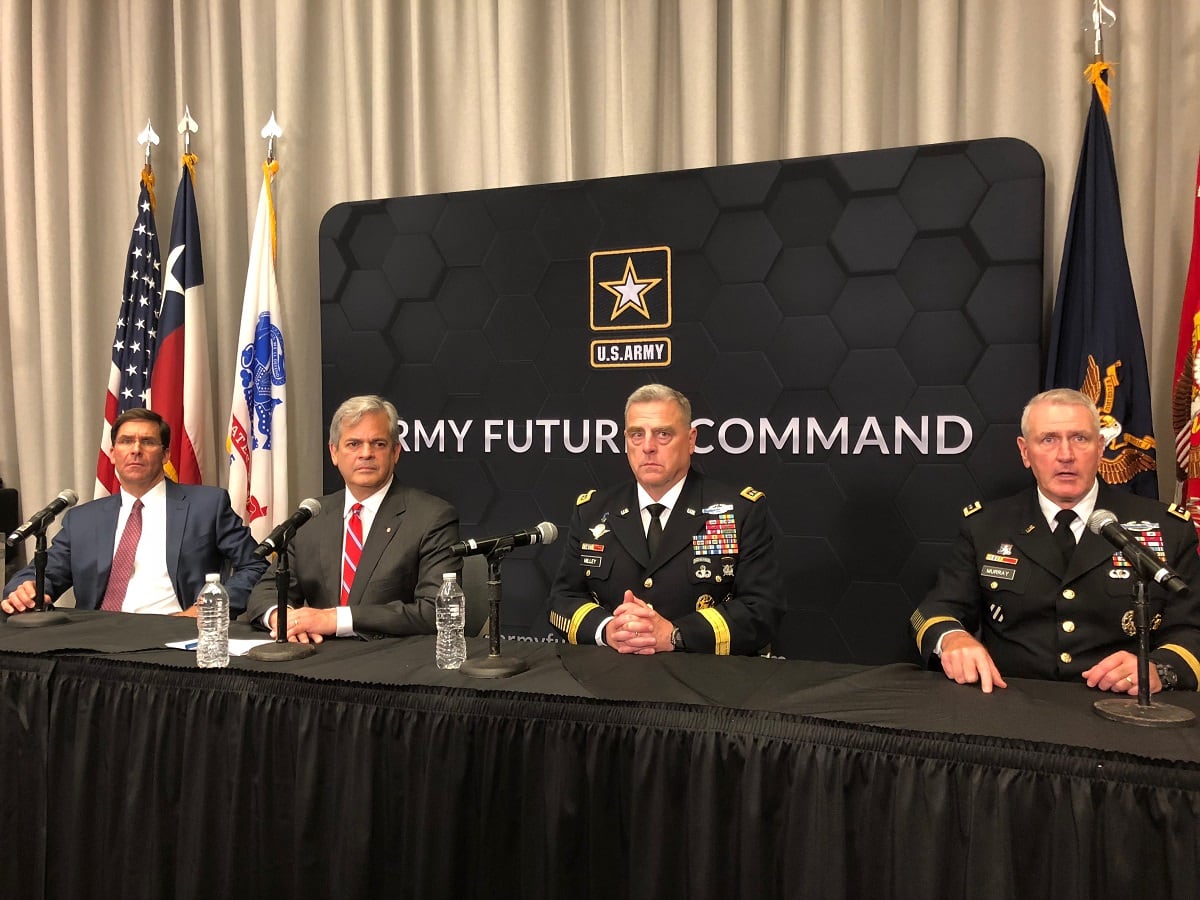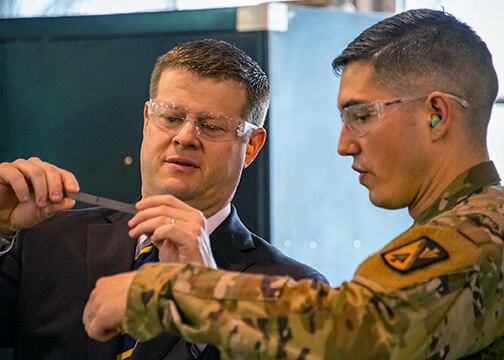WASHINGTON — Now that U.S. Army Secretary Mark Esper is transitioning into the role of defense secretary, with little time for the promotion to sink in, the service will face its first test of whether it can stay the course with a major overhaul of its procurement system and ambitious modernization plans.
Much of the success the Army has seen in recent years, such as launching the four-star Army Futures Command in charge of modernization, can be attributed to the fateful meeting of several unique minds and personalities at the top. The new command also led to reorganizations of some of the service’s major commands, like Training and Doctrine Command and Army Forces Command
Army Chief of Staff Gen. Mark Milley, Vice Chief Gen. James McConville, Under Secretary Ryan McCarthy and Esper were painted by some as a dream team, a group that was able to look at major problems within the Army and come up with a promising, ambitious and, in some ways, nontraditional solution to make up for years of costly mistakes.
But think tankers, policy wonks, lawmakers and even some inside the Defense Department have wondered if the success in launching a disruptive new command has been dependent on the specific leadership at the time of its inception and whether that can survive different leadership down the road.
RELATED

Now that Milley will become the next chairman of the Joint Chiefs of Staff and Esper, if confirmed, will become the next defense secretary, the band is breaking up and a first transition to a new group of leaders at the top of the Army is underway.
While Milley’s move has been known, Esper’s departure came as a surprise.
According to McCarthy, he was about to board a plane at Fort Bliss, Texas, the morning of June 18 when he heard the news that had been delivered to the world via a tweet from President Donald Trump. Trump announced that acting Defense Secretary Patrick Shanahan would be stepping down. He was expected to replace Gen. James Mattis, who resigned as defense secretary late last year. In a subsequent tweet, Trump said Esper would fill in as acting defense secretary.
That night, back in Washington at a rained-out Army event at the National’s ballpark, McCarthy, Milley and the rest of the Army staff discussed what was needed to make adjustments based on the unexpected leadership changes brought about by Esper’s anticipated rise to the top Pentagon job, according to McCarthy.
It became official that Esper would receive the nomination to become the next defense secretary on June 24 just ahead of his trip to NATO in Brussels. Along with that announcement, McCarthy was nominated to become the next Army secretary.
McConville is set to take over as Army chief this summer.
With both McConville and McCarthy officially taking the lead, it’s likely, despite the tumult of a mass leadership change, that the Army will be able to stay the course with its plans because of the central role both leaders played in reshaping the Army over the past several years.
For example, both were front and center with the Army chief and secretary as the service held intense sessions reviewing program after program to see where funds could be shifted to support its new modernization priorities.
RELATED

Lt. Gen. Joseph Martin, who will become a four-star general when he transitions, is slated to take over as Army vice chief this summer. He is already confirmed by the Senate. He previously served as the director of the Army Staff.
McCarthy told a group of reporters at the Pentagon on June 25 that despite changes this summer with a new Army chief, vice chief and sergeants major, “we have circled the wagons and really buckled down, made adjustments to our portfolios and immediate staffs, and put out the word that no policies or priorities are changing.
“We are going to continue our head down and continue to march on the same azimuth that we’ve been on while we work through this transition,” he said.
Temporarily filling in for McCarthy, as a senior official performing the duties of the undersecretary, is the Army general counsel James McPherson. His principal deputy is stepping up to fulfill the duties of general counsel.
McPherson told reporters at the same June 25 press briefing that his job will be to continue with the efforts of modernization reform and uphold the major tenants set out by the previous team of leaders.
“My job will be to continue to assist them,” he said.
McCarthy noted that McPherson has held the job of general counsel for the last 18 months, which, among the Army leadership set to take over, is the minimum amount of time served in a leadership role at the Pentagon.
For the Army, it will be business as usual during the transition. For instance, McCarthy said the Army is sending its next five-year defense plan off to the Office of the Secretary of Defense imminently.
And the service is still campaigning on Capitol Hill with Appropriations committees to ensure it gets the budget it needs to proceed with its major modernization overhaul.
“Our interactions with Congress will be very important between now and the August recess,” McCarthy said.
McCarthy is also turning his focus on recruiting after spending a year and a half on modernization efforts. “It’s a very difficult environment to recruit, so I’m trying to be a recruiter now” he said. He will travel to Fort Knox, Kentucky, next week to visit with Army Recruiting Command, he said, and to see cadets at ROTC training.
In the fall, the Army will have to move into program budget reviews with the Office of the Secretary of Defense, “so a lot of the same big rocks that you have to push every year, we will have to do now,” he said. “We will cover down on that as Esper makes the shift down the hall.”
Jen Judson is an award-winning journalist covering land warfare for Defense News. She has also worked for Politico and Inside Defense. She holds a Master of Science degree in journalism from Boston University and a Bachelor of Arts degree from Kenyon College.








